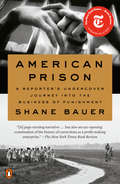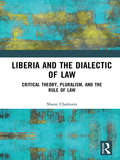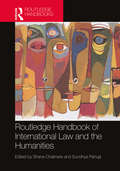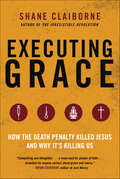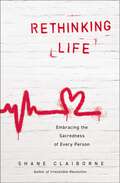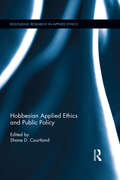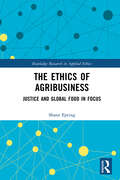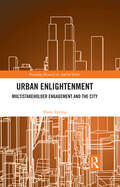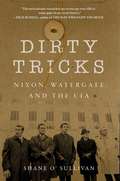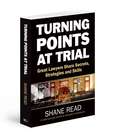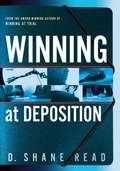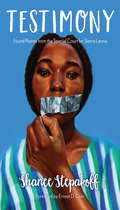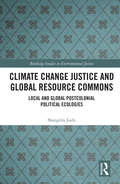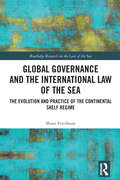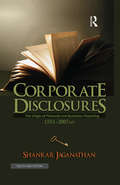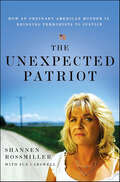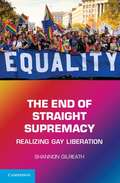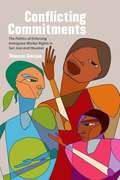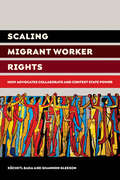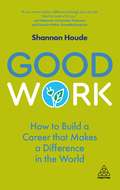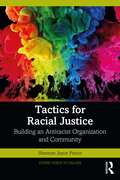- Table View
- List View
American Prison: A Reporter's Undercover Journey into the Business of Punishment
by Shane BauerA ground-breaking and brave inside reckoning with the nexus of prison and profit in America: in one Louisiana prison and over the course of our country's history. <p><p> In 2014, Shane Bauer was hired for $9 an hour to work as an entry-level prison guard at a private prison in Winnfield, Louisiana. An award-winning investigative journalist, he used his real name; there was no meaningful background check. Four months later, his employment came to an abrupt end. But he had seen enough, and in short order he wrote an exposé about his experiences that won a National Magazine Award and became the most-read feature in the history of the magazine Mother Jones. Still, there was much more that he needed to say. <p> In American Prison, Bauer weaves a much deeper reckoning with his experiences together with a thoroughly researched history of for-profit prisons in America from their origins in the decades before the Civil War. For, as he soon realized, we can't understand the cruelty of our current system and its place in the larger story of mass incarceration without understanding where it came from. Private prisons became entrenched in the South as part of a systemic effort to keep the African-American labor force in place in the aftermath of slavery, and the echoes of these shameful origins are with us still. <p> The private prison system is deliberately unaccountable to public scrutiny. Private prisons are not incentivized to tend to the health of their inmates, or to feed them well, or to attract and retain a highly-trained prison staff. Though Bauer befriends some of his colleagues and sympathizes with their plight, the chronic dysfunction of their lives only adds to the prison's sense of chaos. To his horror, Bauer finds himself becoming crueler and more aggressive the longer he works in the prison, and he is far from alone. <p> A blistering indictment of the private prison system, and the powerful forces that drive it, American Prison is a necessary human document about the true face of justice in America.
Liberia and the Dialectic of Law: Critical Theory, Pluralism, and the Rule of Law
by Shane ChalmersIt is the condition of modernity that an institution cannot depend on a god, tradition, or any other transcendental source to secure its foundations, which thereby come to rest upon – or rather in, and through – its subjects. Never wholly separated from its subjects, and yet never identical with them: this contradictory condition provides a way of seeing how modern law gives form to life, and how law takes form, enlivened by its subjects. By driving Theodor Adorno’s dialectical philosophy into the concept of law, the book shows how this contradictory condition enables law to become instituted in ways that are hostile to its subjects, but also how law remains open to its subjects, and thus disposed towards transformation. To flesh out an understanding of this contradiction, the book examines the making and remaking of “Liberia”, from its conception as an idea of liberty at the beginning of the nineteenth century to its reconstruction at the beginning of the twenty-first with the assistance of an international intervention to “establish a state based on the rule of law”. In so doing, the book shows how law is at the epicentre of a colonising power in Liberia that renders subjects as mere objects; but at the same time, the book exposes the instability of this power, by showing how law is also enlivened by its subjects as it takes form in and through their lives and interactions. It is this fundamentally contradictory condition of law that ultimately denies power any absolute hold, leaving law open to the self-expression of its subjects.
Routledge Handbook of International Law and the Humanities
by Shane Chalmers; Sundhya PahujaThis Handbook brings together 40 of the world’s leading scholars and rising stars who study international law from disciplines in the humanities – from history to literature, philosophy to the visual arts – to showcase the distinctive contributions that this field has made to the study of international law over the past two decades. Including authors from Australia, Canada, Europe, India, South Africa, the UK and the USA, all the contributors engage the question of what is distinctive, and critical, about the work that has been done and that continues to be done in the field of ‘international law and the humanities’. For many of these authors, answering this question involves reflecting on the work they themselves have been contributing to this path-breaking field since its inception at the end of the twentieth century. For others, it involves offering models of the new work they are carrying out, or else reflecting on the future directions of a field that has now taken its place as one of the most important sites for the study of international legal practice and theory. Each of the book’s six parts foregrounds a different element, or cluster of elements, of international law and the humanities, from an attention to the office, conduct and training of the jurist and jurisprudent (Part 1); to scholarly craft and technique (Part 2); to questions of authority and responsibility (Part 3); history and historiography (Part 4); plurality and community (Part 5); as well as the challenge of thinking, and rethinking, international legal concepts for our times (Part 6). Outlining new ways of imagining, and doing, international law at a moment in time when original, critical thought and practice is more necessary than ever, this Handbook will be essential for scholars, students and practitioners in international law, international relations, as well as in law and the humanities more generally.
Executing Grace: How the Death Penalty Killed Jesus and Why It's Killing Us
by Shane ClaiborneIn this reasoned exploration of justice, retribution, and redemption, the champion of the new monastic movement, popular speaker, and author of the bestselling The Irresistible Revolution offers a powerful and persuasive appeal for the abolition of the death penalty.The Bible says an eye for an eye. But is the state’s taking of a life true—or even practical—punishment for convicted prisoners? In this thought-provoking work, Shane Claiborne explores the issue of the death penalty and the contrast between punitive justice and restorative justice, questioning our notions of fairness, revenge, and absolution.Using an historical lens to frame his argument, Claiborne draws on testimonials and examples from Scripture to show how the death penalty is not the ideal of justice that many believe. Not only is a life lost, so too, is the possibility of mercy and grace. In Executing Grace, he reminds us of the divine power of forgiveness, and evokes the fundamental truth of the Gospel—that no one, even a criminal, is beyond redemption.
Rethinking Life: Embracing the Sacredness of Every Person
by Shane ClaiborneDrawing on Scripture, church history, and his own story, Shane Claiborne explores how a passion for social justice issues surrounding life and death--such as war, gun ownership, the death penalty, racial injustice, abortion, poverty, and the environment--intersects with our faith as we advocate for life in its totality.Many of us wonder how to think about and act on issues of life and death beyond abortion and the death penalty--yet the heated debates in our churches and the confusion of our own hearts sometimes feel overwhelming. What does a balanced, Christian view of what it means to be "pro-life" really look like?Combining stories, theological reflection, and a little wit with a Southern accent, activist Shane Claiborne explores the battle between life and death that goes back to the Garden of Eden. Shane draws on his childhood growing up in the Bible Belt, his own change of perspective on how to advocate for life, and his years of working on behalf of all people to help us:Learn from the Bible and the early church about valuing lifeDeepen our understanding of what a pro-life stance can look likeDiscover ways to discuss topics that are dividing our culture and churchesFind encouragement when we feel politically homelessRenew our hope that there is a good way forward, even in difficult times We need a new movement that stands up for life--without exceptions. This moving and incredibly timely book creates a larger framework for thinking about God's love and our faith as we embrace a consistent ethic that values human life from womb to tomb.
Hobbesian Applied Ethics and Public Policy (Routledge Research in Applied Ethics)
by Shane D. CourtlandMost philosophers and political scientists readily admit that Thomas Hobbes is a significant figure in the history of political thought. His theory was, arguably, one of the first to provide a justification for political legitimacy from the perspective of each individual subject. Many excellent books and articles have examined the justification and structure of Hobbes’ commonwealth, ethical system, and interpretation of Christianity. What is troubling is that the Hobbesian project has been largely missing in the applied ethics and public policy literature. We often find applications of Kantian deontology, Bentham’s or Mill’s utilitarianism, Rawls’s contractualism, the ethics of care, and various iterations of virtue ethics. Hobbesian accounts are routinely ignored and often derided. This is unfortunate because Hobbes’s project offers a unique perspective. To ignore it, when such a perspective would be fruitful to apply to another set of theoretical questions, is a problem in need of a remedy. This volume seeks to eliminate (or, at the very least, partially fill) this gap in the literature. Not only will this volume appeal to those that are generally familiar with Hobbesian scholarship, it will also appeal to a variety of readers that are largely unfamiliar with Hobbes.
Judges, Law and War: The Judicial Development of International Humanitarian Law
by Shane DarcyInternational courts and judicial bodies play a formative role in the development of international humanitarian law. Judges, Law and War examines how judicial bodies have influenced the substantive rules and principles of the law of armed conflict, and studies the creation, application and enforcement of this corpus of laws. Specifically, it considers how international courts have authoritatively addressed the meaning and scope of particular rules, the application of humanitarian law treaties and the customary status of specific norms. Key concepts include armed conflicts and protected persons, guiding principles, fundamental guarantees, means and methods of warfare, enforcement and war crimes. Consideration is also given to the contemporary place of judicial bodies in the international law-making process, the challenges presented by judicial creativity and the role of customary international law in the development of humanitarian law.
The Ethics of Agribusiness: Justice and Global Food in Focus (Routledge Research in Applied Ethics)
by Shane EptingThis book offers an original perspective on food supply chains. It argues that the ability to trade food on a global scale could be intrinsically good aside from any instrumental value that people gain from it. While the author’s argument seems to counter wholesale anti-agribusiness views, it is consistent with the larger goals of food-justice movements. The author examines the structures of food supply chains, revealing the kinds of harm they help produce. They include slavery, abusive labor, geopolitical exploitation, ecological degradation, and public health impacts. Although the book argues that food supply chains can be collectively beneficial, eliminating their immoral features must hold steady as a continuous enterprise. Securing this outcome means that we go beyond critique. The final chapter advocates for the sustainable food label to address issues of food justice and food sovereignty. The Ethics of Agribusiness will interest researchers and advanced students working in food ethics, environmental ethics, and agricultural ethics.
Urban Enlightenment: Multistakeholder Engagement and the City (Routledge Research in Applied Ethics)
by Shane EptingThis book applies the concept of moral ordering to urban affairs. It demonstrates how multi-stakeholder engagement can enhance the quality of city life while supporting ambitions such as ethical urban sustainability and human flourishing. While there is a history of philosophers viewing cities as technologies, cities’ encompassing nature inherently limits them. Urban sustainability matters often affect marginalized and vulnerable people, the public, nonhuman species, future generations, and urban artifacts. Problems can arise when stakeholders’ interests and needs appear at odds. The author argues in favor of the concept of moral ordering, a process designed to address issues involving different stakeholder groups such as municipal officials and residents. By employing moral ordering, a view comes into focus, revealing that the attention that each group receives reflects their place in the process, providing the necessary degree of moral respect. Finally, the author shows how moral ordering can lead to urban enlightenment. He examines real-world applications of moral ordering, such as New York City’s Participatory Budgeting Project, to make the case that municipalities can begin to bolster municipal-community relations in ways that promote urban enlightenment. Urban Enlightenment will appeal to researchers and advanced students working in philosophy of the city, applied ethics, philosophy of technology, urban planning, environmental studies, and political science.
Why Torture Doesn't Work: The Neuroscience of Interrogation
by Shane O'MaraBesides being cruel and inhumane, torture does not work the way torturers assume it does. As Shane O'Mara's account of the neuroscience of suffering reveals, extreme stress creates profound problems for memory, mood, and thinking, and sufferers predictably produce information that is deeply unreliable, or even counterproductive and dangerous.
Dirty Tricks: The Dark Side of Democracy
by Shane O'SullivanThe victory of Richard Nixon in the US presidential election of 1968 swung on an “October Surprise”— a treasonous plot engineered by key figures in the Republican Party to keep the South Vietnamese government away from peace talks in Paris, costing thousands of American lives. There is growing evidence that the CIA was deeply involved in illegal domestic operations targeting Daniel Ellsberg, and in the Watergate break-ins during Nixon’s 1972 campaign, which ultimately led to his downfall. CIA Director Richard Helms’ relationship with Watergate burglar E. Howard Hunt was much closer than previously disclosed and the CIA agent inside the plot was sent on a double agent mission by American intelligence after he got out of prison. Drawing on newly-declassified files and previously-unpublished documents, Dirty Tricks debunks the myths around Watergate and deepens our understanding of the “dirty tricks” that undermined democracy during the Nixon years and destroyed public trust in politics during the seventies. These scandals turn on the covert action of two powerful interest groups—the senior CIA officers around Helms, and the key advisers around Nixon – in this chilling story of political espionage and deception.
Turning Points At Trial: Great Lawyers Share Secrets, Strategies And Skill
by Shane ReadThirteen of the greatest lawyers in the country, such as Robert S. Bennett, Alan Dershowitz, Mark Lanier, Bryan Stevenson, and Tom Girardi share with you the powerful secrets from their most interesting cases, from depositions to trials to appeals. Lawyers can apply these techniques immediately in their practice. Non lawyers will get a front row seat to these fascinating lawyers and the turning points in their most intriguing cases. There are also 447 tips summarized in chapter checklists. Leaders of the best litigation organizations and judges have called Turning Points the best trial advocacy book. In addition, the book's website has related audio and video clips that enhance the lessons that are taught. Today's most successful lawyers benefit from the wisdom described in this book and now you can too.The book is divided into seven parts: opening statement, direct examination, cross-examination, cross-examination of the expert witness, closing argument, deposition, and appellate oral argument. In each part, there are chapters that profile an attorney famous for his or her skills and an analysis of court transcripts where that skill was displayed. For example, chapter one features Mark Lanier, who has achieved nationally recognized record-setting jury awards. Lanier candidly reveals his strategies and secrets for creating a spellbinding opening statement. The author, an accomplished trial attorney and highly acclaimed teacher, then extensively analyzes a court transcript from one of Lanier's famous trials so you can learn the building blocks for an opening statement and apply Lanier's techniques at your next trial. At the end of the chapter, there is a checklist that summarizes Lanier's tips.Other chapters feature highly acclaimed lawyers such as Alan Dershowitz who explains the key to a successful cross-examination and Lisa Blatt, the woman with the most appearances before the U.S. Supreme Court, who shares her secrets for a successful oral argument. In short, this book will teach you everything you need to know from deposition to trial to appellate oral advocacy from
Winning at Deposition
by Shane Read<p>Winning at Deposition won the highest award available for legal publications: ACLEA's Award for Professional Excellence. The book won first prize from a field of over 300 entries submitted by continuing legal education publishers from across the USA. Written by the best-selling author of Winning at Trial, this book shows beginning and experienced attorneys how to win at deposition every time. With the first chapter explaining all the ins and outs of taking and defending a deposition, the remainder of the book reveals strategies that will help every lawyer vastly improve his deposition skills. <p>Discover why much of the conventional wisdom about depositions is completely wrong, learn how to beat an expert witness every time, get innovative advice on witness preparation, and master the secrets that guarantee success with argumentative lawyers and lying witnesses. Unlike any other book, this one teaches from transcripts and videos of actual depositions. You will learn from the skillful techniques---and memorable failures---that occurred at the most famous depositions of all time, those of President Bill Clinton, Bill Gates, and O.J. Simpson. It's all here, clearly explained in an easy-to-understand format. In addition, the book provides detailed analysis of video depositions located at the book's website www.winningatdeposition.com</p>
Testimony: Found Poems from the Special Court for Sierra Leone (The Griot Project Book Series)
by Shanee StepakoffSierra Leone’s devastating civil war barely caught the attention of Western media, but it raged on for over a decade, bringing misery to millions of people in West Africa from 1991 to 2002. The atrocities committed in this war and the accounts of its survivors were duly recorded by international organizations, but they run the risk of being consigned to dusty historical archives. Derived from public testimonies at a UN-backed war crimes tribunal in Freetown, this remarkable poetry collection aims to breathe new life into the records of Sierra Leone’s civil war, delicately extracting heartbreaking human stories from the morass of legal jargon. By rendering selected trial transcripts in poetic form, Shanee Stepakoff finds a novel way to communicate not only the suffering of Sierra Leone’s people, but also their courage, dignity, and resilience. Her use of innovative literary techniques helps to ensure that the voices of survivors are not forgotten, but rather heard across the world. This volume also includes an introduction that explores how the genre of “found poetry” can serve as a uniquely powerful means through which writers may bear witness to atrocity. This book’s unforgettable excavation and shaping of survivor testimonies opens new possibilities for speaking about the unspeakable.
Climate Change Justice and Global Resource Commons: Local and Global Postcolonial Political Ecologies (Routledge Studies in Environmental Justice)
by Shangrila JoshiThis book examines the multiple scales at which the inequities of climate change are borne out. Shangrila Joshi engages in a multi-scalar analysis of the myriad ways in which various resource commons – predominantly atmosphere and forests – are implicated in climate governance, with a consistent emphasis throughout on the justice implications for disenfranchised communities. The book starts with an analysis of North-South inequities in responsibility, vulnerability, and capability, as evidenced in global climate treaty negotiations from Rio to Paris. It then moves on to examine the ways in which structural inequalities are built into the conceptualization and operationalization of various neoliberal climate solutions such as Reducing Emissions from Deforestation and Forest Degradation (REDD+) and the Clean Development Mechanism (CDM). Drawing on qualitative interviews conducted in Delhi, Kathmandu, and the Terai region of Nepal, participant observation at the Climate Conference in Copenhagen (COP-15), and textual analysis of official documents, the book articulates a geography of climate justice, considering how ideas of injustice pertaining to colonialism, race, Indigeneity, caste, gender, and global inequality intersect with the politics of scale. This book will be of great interest to students and scholars of environmental justice, climate justice, climate policy, political ecology, and South Asian studies.
Global Governance and the International Law of the Sea: The Evolution and Practice of the Continental Shelf Regime (Routledge Research on the Law of the Sea)
by Shani FriedmanThis book conducts an examination of the international legal regime of the continental shelf through the lens of international relations (IR), with a primary focus on global governance theory.Presenting a new perspective within the field of IR and international law, the book offers new insights into the rules, principles, practices, and actors that establish and govern social interactions and the management of common affairs at the transnational level. The governance framework within the continental shelf can encompass a wider scope than legal laws alone, incorporating informal rules or potentially disregarding formal “black letter” rules that may not be effectively applied in practice. To exemplify how governance theory and other IR theories contribute to the analysis of the legal regime concerning the continental shelf, the book conducts an in-depth examination of three significant issues: (i) the demarcation and delimitation of the continental shelf, (ii) the rights and obligations of coastal States in the continental shelf, and (iii) procedural matters related to the continental shelf and international maritime adjudication.This book will be of interest to students and scholars in the field of the law of the sea, international law, global governance, and international relations.
Corporate Disclosures: The Origin of Financial and Business Reporting 1553 - 2007 AD
by Shankar JaganathanSpanning over two millennia of time and five continents of space, this book narrates the unfolding of financial and business reporting. The first part of the book traces the origin of the 'company' as a form of organization and the evolution of bookkeeping. The second part: The Accounting Edifice, depicts events that led to the disclosure of the balance sheet, the profit and loss account, cash flow statements and the practice of auditing. In the third part: Reaching out to the Shareholders, the author explores the need for governance, reporting of intangible assets and the emergence of annual reports. Indian Corporate Disclosures, the fourth and the last part, sketches the panorama of post-independent dvelopments in Indian corporate disclosures using heritage IT companies, Wipro and Infosys as examples. The last chapter of the book contrasts disclosures by the Indian Sensex companies in 2007 with the best global practices.
The Unexpected Patriot: How an Ordinary American Mother Is Bringing Terrorists to Justice
by Sue Carswell Shannen RossmillerAfter 9/11, when the nation was still in shock over the unprecedented attack on U.S. soil, Shannen Rossmiller, a country judge and mother of three in rural Montana, was formulating a plan. Soon she was devouring literature on Islamic culture, teaching herself Arabic, and preparing to infiltrate the central nervous system of global terror: online networks. Her efforts succeeded beyond imagination. Posing as an Islamic terrorist under dozens of screen aliases, she joined forces with the FBI and started trolling jihadist chat rooms, striking up conversations at 3am with men as far away as Pakistan, and amassing evidence against an array of suspected terrorists both at home and abroad. Her work laid the foundation for the online searches so crucial to law enforcement's fight against terror today. Shannen's husband, Randy, uncovered her double life after a chat room terrorist wiped out the family computer and reports rolled in that the Rossmillers were being targeted for reprisal. Undeterred, Shannen started working with the FBI on sting operations, involving everything from jihadist cells to weapons caches to bomb plots, and bringing many of her targets to justice, as well as pioneering the digital entrapment tactics that are at the forefront of today's war on terror. This is the story of one woman's unexpected courage and how it changed the face of this global struggle.
Fighting King Coal: The Challenges to Micromobilization in Central Appalachia
by Shannon Elizabeth BellIn the coal-mining region of Central Appalachia, mountaintop-removal mining and coal-industry-related flooding, water contamination, and illness have led to the emergence of a grassroots, women-driven environmental justice movement. But the number of local activists is small relative to the affected population, and recruiting movement participants from within the region is an ongoing challenge. In Fighting King Coal, Shannon Elizabeth Bell examines an understudied puzzle within social movement theory: why so few of the many people who suffer from industry-produced environmental hazards and pollution rise up to participate in social movements aimed at bringing about social justice and industry accountability. Using the coal-mining region of Central Appalachia as a case study, Bell investigates the challenges of micromobilization through in-depth interviews, participant observation, content analysis, geospatial viewshed analysis, and an eight-month "Photovoice" project -- an innovative means of studying, in real time, the social dynamics affecting activist involvement in the region. Although the Photovoice participants took striking photographs and wrote movingly about the environmental destruction caused by coal production, only a few became activists. Bell reveals the importance of local identities to the success or failure of local recruitment efforts in social movement struggles, ultimately arguing that, if the local identities of environmental justice movements are lost, the movements may also lose their power.
Fighting King Coal: The Challenges to Micromobilization in Central Appalachia (Urban and Industrial Environments)
by Shannon Elizabeth BellAn examination of why so few people suffering from environmental hazards and pollution choose to participate in environmental justice movements. In the coal-mining region of Central Appalachia, mountaintop-removal mining and coal-industry-related flooding, water contamination, and illness have led to the emergence of a grassroots, women-driven environmental justice movement. But the number of local activists is small relative to the affected population, and recruiting movement participants from within the region is an ongoing challenge. In Fighting King Coal, Shannon Elizabeth Bell examines an understudied puzzle within social movement theory: why so few of the many people who suffer from industry-produced environmental hazards and pollution rise up to participate in social movements aimed at bringing about social justice and industry accountability. Using the coal-mining region of Central Appalachia as a case study, Bell investigates the challenges of micromobilization through in-depth interviews, participant observation, content analysis, geospatial viewshed analysis, and an eight-month “Photovoice” project—an innovative means of studying, in real time, the social dynamics affecting activist involvement in the region. Although the Photovoice participants took striking photographs and wrote movingly about the environmental destruction caused by coal production, only a few became activists. Bell reveals the importance of local identities to the success or failure of local recruitment efforts in social movement struggles, ultimately arguing that, if the local identities of environmental justice movements are lost, the movements may also lose their power.
The End of Straight Supremacy: Realizing Gay Liberation
by Shannon GilreathRooted in the politics and theories of early gay liberation and radical feminism, Shannon Gilreath's The End of Straight Supremacy presents a cohesive theory of gay life under straight domination. Beginning with a critique of formal equality law, centering on the 'like-straight' demands of liberal equality theory as highlighted in Lawrence v. Texas, Gilreath moves to criticize the gay movement itself, challenging the assimilation politics behind the movement's blithe acceptance of discrimination in the guise of free speech and pornography in the name of sexual liberation, as well as same-sex marriage and transsexuality as tools of straight hegemony. Ultimately, Gilreath rejects both the liberal demand for gay erasure in exchange for meager legal progress and the gay establishment agenda. In The End of Straight Supremacy, Gilreath calls gays and their allies to the difficult task of rethinking what liberation and equality really mean.
Conflicting Commitments
by Shannon GleesonIn Conflicting Commitments, Shannon Gleeson goes beyond the debate over federal immigration policy to examine the complicated terrain of immigrant worker rights. Federal law requires that basic labor standards apply to all workers, yet this principle clashes with increasingly restrictive immigration laws and creates a confusing bureaucratic terrain for local policymakers and labor advocates. Gleeson examines this issue in two of the largest immigrant gateways in the country: San Jose, California, and Houston, Texas. Conflicting Commitments reveals two cities with very different approaches to addressing the exploitation of immigrant workers-both involving the strategic coordination of a range of bureaucratic brokers, but in strikingly different ways. Drawing on the real life accounts of ordinary workers, federal, state, and local government officials, community organizers, and consular staff, Gleeson argues that local political contexts matter for protecting undocumented workers in particular. Providing a rich description of the bureaucratic minefields of labor law, and the explosive politics of immigrant rights, Gleeson shows how the lessons learned from San Jose and Houston can inform models for upholding labor and human rights in the United States.
Scaling Migrant Worker Rights: How Advocates Collaborate and Contest State Power
by Shannon GleesonA free ebook version of this title is available through Luminos, University of California Press’s Open Access publishing program. Visit www.luminosoa.org to learn more. As international migration continues to rise, sending states play an integral part in "managing" their diasporas, in some cases even stepping in to protect their citizens' labor and human rights in receiving states. At the same time, meso-level institutions—including labor unions, worker centers, legal aid groups, and other immigrant advocates—are among the most visible actors holding governments of immigrant destinations accountable at the local level. The potential for a functional immigrant worker rights regime, therefore, advocates to imagine a portable, universal system of justice and human rights, while simultaneously leaning on the bureaucratic minutiae of local enforcement. Taking Mexico and the United States as entry points, Scaling Migrant Worker Rights analyzes how an array of organizations put tactical pressure on government bureaucracies to holistically defend migrant rights. The result is a nuanced, multilayered picture of the impediments to and potential realization of migrant worker rights.
Good Work: How to Build a Career that Makes a Difference in the World
by Shannon HoudeDo you want to have a positive impact on the world? Do you want to have a successful career that makes a difference? In short... do you want to do Good Work? Let this step-by-step guide show you how. Packed with useful tools and exercises, this step-by-step guide will help you figure out your passion and purpose, and how to effectively harness it to make real and positive change - on the world, and on your career. Whether you want to battle climate change, promote diversity and inclusion, work in sustainability - or if you're not sure, but just want to leave things a little better at the end of every work day - let this book support you in turning that passion into action. Written by corporate responsibility consultant and certified coach Shannon Houde, this book is part career guide and part job search help - and all purpose-driven. From understanding what the 'purpose economy' is and how you fit into it, to what jobs to go for and how to land them, Good Work is the helping hand you need to make a career out of changing the world.
Tactics for Racial Justice: Building an Antiracist Organization and Community (Giving Voice to Values)
by Shannon Joyce PrinceThis is not a book of antiracist theory but antiracist tactics – tactics that anyone, of any race, can use to strike a blow against injustice. Antiracism is not about what we feel but what we do, and there are specific techniques we can use to create a just world. Antiracist strategies are skills that can be learned just as we learn skills for public speaking or hitting a baseball. In these pages, you – whether a person of color or white – will find a playbook for leading your workplace, organization, or community through transformative change in the wake of an act of explicit racism. You’ll learn to play antiracist rhetorical chess, and to anticipate and effectively respond to the discursive moves of people who don’t understand bigotry, aren’t aware of it, are in denial of it, or even actively uphold it – so that you can advance justice goals. You’ll get a blueprint of how to dismantle systemic racism community by community, workplace by workplace, and organization by organization – and examples of what not to do. This book is aimed at people who are conscious of the reality of racism and want to end it but may not know how. It clearly shows how anyone can make an effective, significant, and measurable impact on racism through strategic action.
